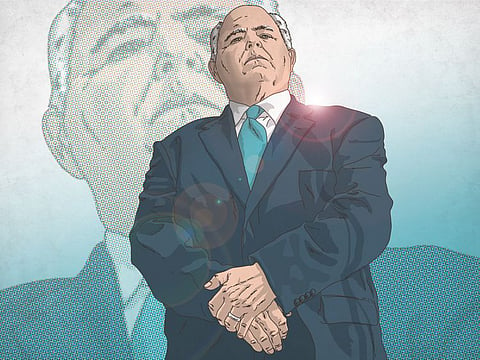Newsmaker: Rush Limbaugh — A barbed voice who divided America
Influential radio personality who outraged all with a history of sexist, racist remarks

We are not supposed to speak ill of the dead. Better then to let Rush Limbaugh, the ultraconservative radio host who become probably the most influential and divisive commentators in the US, speak for himself. Well, not physically, which would be impossible, given that he died on Wednesday — he was 70. And he took career-long malicious joy in spreading division and undermining the credibility of journalism and truth, liberal values and reasoned political debate. He out-Trumped Fox News and outfoxed Donald Trump supporters long before there was a Fox or Trump somewhere over the American horizon.
If you don’t know anything about the man who single-handedly saved the AM dial on a lot of radio stations that stitch together and clothe the gnarly sackcloth of the American underbelly, bear in mind that he died of lung cancer and once said this on the dangers of second-hand smoking and smoking in general: “That is a myth. That has been disproved at the World Health Organisation and the report was suppressed. There is no fatality whatsoever. There’s no even major sickness component associated with second-hand smoke. It may irritate you, and you may not like it, but it will not make you sick, and it will not kill you ... First-hand smoke takes 50 years to kill people, if it does. Not everybody that smokes gets cancer. Now, it’s true that everybody who smokes dies, but so does everyone who eats carrots ... I would like a medal for smoking cigars, is what I’m saying.”
His surviving — and fourth — wife Kathryn had a different take on the death of her very public husband.
“For over 32 years, Rush has cherished you, his loyal audience, and always looked forward to every single show,” she said, adding that “losing a loved one is terribly difficult, even more so when that loved one is larger than life.”
Limbaugh wasn’t the first to do right-wing ideological commentary on the radio. But he was the best. Or worst. And people tuned in to harvest or hate his opinions, disconnecting callers he disagreed with flare.
Revered by conservatives and conspiracy theorists, Limbaugh once said: ”I can only read so many New York Times stories before I puke.”
That was one of his milder ones.
Yes, Limbaugh, who observed “if any race of people should not have guilt about slavery, it’s Caucasians,” was also a Presidential Medal of Freedom recipient in 2020.
For the tens of millions who followed Limbaugh’s show on the airwaves, it was a medal earned for delivering right-wing ideology a voice absent elsewhere in pop culture.
“You’ll note nobody takes me on my ideas,” Limbaugh told NBC’s in 2010. “Nobody argues, they always say, ‘God, you hear what he said? He’s this, he’s that, he’s outrageous, he’s bombastic.’ Those are attempts to discredit me among people who don’t listen to me. But the media didn’t make me and they can’t break me.”
He was born Jan. 12, 1951, in Cape Girardeau, Missouri, and quickly emerged as the black sheep of a family already well respected in conservative circles. His paternal grandfather, Rush Hudson Limbaugh, served as a US ambassador to India during the Eisenhower administration; his uncle Stephen was a federal judge appointed by President Ronald Reagan; and his father, Rush, was a Second World War fighter pilot turned attorney.
But as a child, Limbaugh said he showed little penchant for schooling and little ambition — at least until he got his first radio job while still in high school, deejaying under a pseudonym at a station co-owned by his father.
After spending just one year at Southeast Missouri State University, Limbaugh embarked on his career in radio full time in 1971.
His big break would come in 1984, when he landed a job as an on-air host at Sacramento’s KFBK and quickly became a local hit.
It would take the 1987 repeal of the Fairness Doctrine to make him a national one. It removed a long-standing requirement for television and radio stations to devote an equal amount of time to each side of a political issue. Impressed by his ratings, the ABC Radio Network hired Limbaugh and brought him to New York City to launch a nationally syndicated show in 1988.
“The Rush Limbaugh Show” satiated the appetite for a predominantly white male audience that didn’t care for being talked down to by intellectuals. His words earned him a reputation as a racist, sexist and homophobe over the years for comments on a wide variety of public figures including Chelsea Clinton, President Barack Obama, NFL players and many others.
In 2003, Limbaugh resigned from a short stint as a football host on ESPN following his criticism of a Black quarterback. That same year, he admitted to being addicted to prescription painkillers.
In 2012, Limbaugh made a rare apology after he made derogatory comments about Georgetown law student Sandra Fluke, who gave a speech to House Democrats advocating for insurance coverage of contraceptives. And last year, as confirmed cases of Covid-19 were starting to pile up, Limbaugh took to the airwaves to peddle conspiracy theories that continue to do damage to the fight against this virus.
His legacy will be the bitter political culture that now sickens America.
“You can accomplish a lot just by creating fear and panic,” he said when Hurricane Irma hit Florida in 2017. “You don’t need a hurricane to hit anywhere. All you need is to create the fear and panic accompanied by talk that climate change is causing hurricanes to become more frequent and bigger and more dangerous, and you create the panic, and it’s mission accomplished, agenda advanced.”
But he later evacuated his Florida home because of the hurricane, one of the rare instances when his actions spoke louder than his very loud words.
With inputs from agencies






